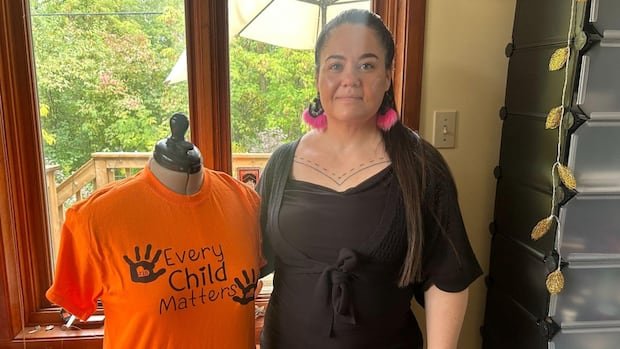In Jennifer Qupanuaq May’s cozy home office in Pointe-Claire, Montreal, a vibrant orange fabric drapes the table. Displayed on a mannequin is one of her custom-made shirts bearing the inscription, “Grandson of a Residential School Survivor.” Reflecting on the impact of her work, May shared how her daughter wore a similar shirt to school, prompting teachers to acknowledge the presence of Indigenous children in their midst.
Hailing from Kuujjuaq in northern Quebec’s Nunavik region, May has been crafting orange shirts for the past four years as a personal endeavor to initiate important conversations within her community. She expressed her motivation, stating, “I aimed to start dialogues within the families around me, beginning with the children, as they are the foundation.”
Commemorated annually on September 30 as Orange Shirt Day, officially designated as the National Day for Truth and Reconciliation, the occasion calls on individuals nationwide to don orange attire to honor the Indigenous children who endured residential schools and their families. However, the increasing commercial availability of these shirts has raised concerns about diluting their impactful message.
Originating from the poignant story of Phyllis Webstad, a member of the Northern Secwepemc from Stswecem’c Xgat’tem First Nation, the orange shirt symbolizes the cultural suppression suffered by generations of Indigenous children within the residential school system. Orange Shirt Day serves as a somber reminder of the lost children and the survivors grappling with enduring trauma.
While the grassroots initiative by Indigenous artists has now permeated mainstream markets, with orange shirts widely accessible through online platforms and major retailers, some individuals fear that the essence of the symbol is being compromised. Artists like Mi’kmaw creator Stephen Jerome voice concerns over the commercialization’s potential to diminish the shirt’s intrinsic significance.
May echoes this sentiment, encouraging individuals to support Indigenous artists directly or opt for plain orange shirts over mass-produced alternatives from chain stores. On the contrary, proponents of wider distribution view it as a means to amplify the message. The Orange Shirt Society, founded by Webstad, has forged partnerships with prominent retailers to heighten visibility and generate funds for survivor support programs.
Amidst differing perspectives on commercialization, the overarching goal remains to educate and commemorate. For May, crafting orange shirts serves as a perpetual tribute to her community’s history and resilience. Regardless of where the shirts are produced or sold, the shared sentiment among artists and survivors emphasizes the enduring importance of cherishing every child.

